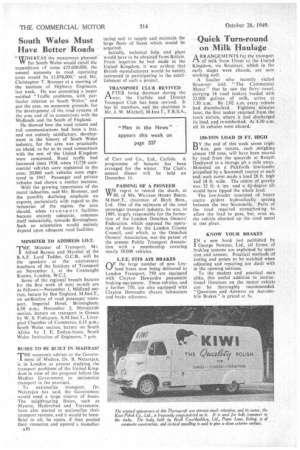South Wales . Must Have Better Roads
Page 32

If you've noticed an error in this article please click here to report it so we can fix it.
"WHEREAS the motorways planned
WHEREAS
South Wales would entail the expenditure of some £35.000.000. the annual economy in road operating costs would be £1,078,000," said, Mr. Christopher T. Brunner at a meeting of the Institute of Highway Engineers, last week. He was presenting a paper entitled "Traffic problems, with particular relation to South Wales." and put the case, on economic grounds, for the development or the road systems of the area and of its connections with the Midlands and he South of England.
He showed how the road system and rail communications had been a late., and not entirely satisfactory, development in the history of South Wales industry, for the area was practically an island, as far as its road connections with the rest of the United Kingdom were concerned. Road traffic had increased since 1938, when 15,728 commercial vehicles were registered in the area; 20,060 such vehicles were registered in 1947. Passenger and private vehicles had shown a similar increase.
With the growing importance of the metal industries. said Mr. Brunner, and the possibly declining emphasis on exports, particularly with regard to the industries of the region, the area should, when tr an sport facilities became entirely adequate, orientate itself industrially, towards Birmingham. Such an orientation would entirely depend upon adequate road facilities.
MINISTER TO ADDRESS I.O.T.
THE Minister of Transport, Mr. Alfred Barnes, and Marshal of the R.A.F. Lord Tedder, G.C.B., will be the speakers at the anniversary luncheon of the Institute of Transport on November 1, at the Connaught Rooms, London, W.C.2.
Some of the regional branch fixtures for the first week of next month are as follows:—November I, Midland section, lecture by Ben England, M.Inst.T., on unification of road passenger transport, Imperial Hotel, Birmingham, 6.30 p.m.; November 3, Merseyside section, lecture on transport in Greece by W. S. Finlayson. A.M.Inst.T., Liverpool Chamber of Commerce, 6.15 p.m.; South Wales section, lecture on South Africa by J. E. Emlyn-Jones, South Wales Institution of Engineers, 7 p.m.
BUSES TO BE BUILT IN MADRAS?
THE economic adviser to the Govern' ment bf Madras, Dr. B. Natarajan. is in London at present studying the transport problems of the United Kingdom in view of the proposal before the Madras Government to nationalize transport in the province.
To nationalize transport, Dr. Natarajan has said, the Government would need a large reserve of buses. The neighbepring States, such as • Mysore, Hyderabad and Travancore, have also started to nationalize their transport systems, and it would be beneficial to all, he states, if they pooled their resources and opened a manufac a30 tntine• unit to supply and maintain the large fleets of buses which would be acquired.
Initially, technical help and plant. would have to be obtained from Britain. From inquiries he' had Made in the United Kingdom, it was evident that British manufacturers would be keenly. interested in participating in the establishment of such a project.
TRANSPORT CLUB REVIVED
AFTER being dormant during the war, the Carlisle and District, Transport Club has been revived. It has 61 members, and the chairman is
Mr. J. W. Mitchell, F.R,S.A., of Carr and Co., Ltd.. Carlisle. A programme of lectures has been arranged for the winter. The Club's annual dinner will be held on December 16.
PASSING OF A PIONEER
• WE regret to record the death, at VV 80, of MR. WILLIAM HENRY BIRCH, M.INST.T., chairman of Birch Bros., Ltd. One of the stalwarts of the road passenger transport industry, he was, in 1889, largely responsible for the formation of the London Omnibus Owners' Federation, which opposed the operation of buses by the London County Council, and which, as the Omnibus Owners' Association, was the parent of the present Public Transport Association with a membership covering nearly 50,000 vehicles.
L.T.E. FITS AIR BRAKES
OF the large number of new Leyland buses now being delivered to London Transport, 750 are equipped with Clayton Dewandre pneumatic braking equipment. These vehicles, and a further 750, are also equipped with Clayton Dewandre chassis • lubricators and brake adjusters.




























































































